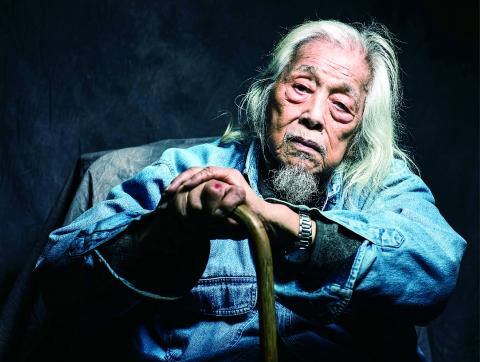Taiwanese yesterday offered messages of condolence after Taiwanese independence advocate Su Beng (史明) died late on Friday at the age of 100.
Doctors said he died from multiple organ failure.
Su Beng Education Foundation chairwoman Huang Min-hung (黃敏紅) thanked people who offered their condolences on Facebook.

Photo provided by Avanguard Publishing
“Su lived a long and fulfilling life, he does not owe Taiwan anything. Now it is up to Taiwan to determine its own path,” Huang told a news conference in Taipei.
Su’s last words were that “Taiwan must win, and to do so, [President] Tsai Ing-wen (蔡英文) must win a second term,” Huang said.
Su had no children or wealth, having dedicated his life and fortune to the independence movement, Huang said, adding that the foundation would find a suitable location for a memorial.
Many people left messages on Su’s Facebook page, thanking him for his efforts to promote democracy and independence.
Tsai late on Friday wrote on Facebook that she had just visited Su two days earlier, and that while his condition was critical, she had not expected him to pass away so soon.
They had Lunar New Year’s Eve dinner together every year, Tsai said, adding that she would leave a chair for him at next year’s dinner table to commemorate his life of dedication.
Premier Su Tseng-chang (蘇貞昌) yesterday said that Su Beng had dedicated his life to Taiwan, not only writing about its history, but also forgoing personal pleasures and dedicating his time to bringing about Taiwanese autonomy.
“We must cherish his memory and legacy, and guard it well, so that our progeny can be independent,” the premier said.
The Democratic Progressive Party tipped its hat to Su Beng for his efforts and said in a statement that it would continue efforts to reinforce the concept of Taiwanese sovereignty based on its Resolution on Taiwan’s Future.
Su Beng was born to a wealthy family in Taipei’s Shilin District (士林) on Nov. 9, 1918.
He left Taiwan to study at Waseda University in Japan, where he seemed to adopt Marxism. After graduating in 1942, he went to China, where he worked undercover as part of the Chinese Communist Party’s (CCP) anti-Japanese efforts.
He returned to Taiwan in 1949 because he was discontented with the CCP’s actions, and since then pushed for Taiwanese independence.
In 1952, he was a fugitive from the Chinese Nationalist Party (KMT) under Chiang Kai-shek (蔣介石) because of a plot to assassinate Chiang.
He stowed away on a boat to Japan, which gave him political asylum, and from 1952 to 1993 he operated a noodle shop in Tokyo, the proceeds of which he used to promote Taiwanese independence.
While there, he also began writing Taiwan’s 400-Year History (台灣人四百年史).
Named Shih Chao-hui (施朝暉) at birth, he changed his name to Su Beng — which means “historically clear” in Hoklo (commonly known as Taiwanese) — to underline the importance of having a clear understanding of history.
Su Beng returned to Taiwan in 1993 after martial law ended and his status as a political dissident was lifted.

NATIONAL SECURITY THREAT: An official said that Guan Guan’s comments had gone beyond the threshold of free speech, as she advocated for the destruction of the ROC China-born media influencer Guan Guan’s (關關) residency permit has been revoked for repeatedly posting pro-China content that threatens national security, the National Immigration Agency said yesterday. Guan Guan has said many controversial things in her videos posted to Douyin (抖音), including “the red flag will soon be painted all over Taiwan” and “Taiwan is an inseparable part of China,” while expressing hope for expedited “reunification.” The agency received multiple reports alleging that Guan Guan had advocated for armed reunification last year. After investigating, the agency last month issued a notice requiring her to appear and account for her actions. Guan Guan appeared as required,

A strong cold air mass is expected to arrive tonight, bringing a change in weather and a drop in temperature, the Central Weather Administration (CWA) said. The coldest time would be early on Thursday morning, with temperatures in some areas dipping as low as 8°C, it said. Daytime highs yesterday were 22°C to 24°C in northern and eastern Taiwan, and about 25°C to 28°C in the central and southern regions, it said. However, nighttime lows would dip to about 15°C to 16°C in central and northern Taiwan as well as the northeast, and 17°C to 19°C elsewhere, it said. Tropical Storm Nokaen, currently

PAPERS, PLEASE: The gang exploited the high value of the passports, selling them at inflated prices to Chinese buyers, who would treat them as ‘invisibility cloaks’ The Yilan District Court has handed four members of a syndicate prison terms ranging from one year and two months to two years and two months for their involvement in a scheme to purchase Taiwanese passports and resell them abroad at a massive markup. A Chinese human smuggling syndicate purchased Taiwanese passports through local criminal networks, exploiting the passports’ visa-free travel privileges to turn a profit of more than 20 times the original price, the court said. Such criminal organizations enable people to impersonate Taiwanese when entering and exiting Taiwan and other countries, undermining social order and the credibility of the nation’s

‘SALAMI-SLICING’: Beijing’s ‘gray zone’ tactics around the Pratas Islands have been slowly intensifying, with the PLA testing Taiwan’s responses and limits, an expert said The Ministry of National Defense yesterday condemned an intrusion by a Chinese drone into the airspace of the Pratas Islands (Dongsha Islands, 東沙群島) as a serious disruption of regional peace. The ministry said it detected the Chinese surveillance and reconnaissance drone entering the southwestern parts of Taiwan’s air defense identification zone early yesterday, and it approached the Pratas Islands at 5:41am. The ministry said it immediately notified the garrison stationed in the area to enhance aerial surveillance and alert levels, and the drone was detected in the islands’ territorial airspace at 5:44am, maintaining an altitude outside the effective range of air-defense weaponry. Following